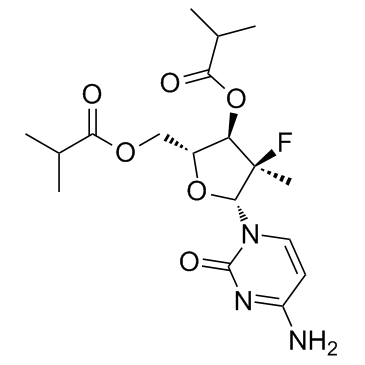R-7128
Modify Date: 2025-09-08 10:09:13

R-7128 structure
|
Common Name | R-7128 | ||
|---|---|---|---|---|
| CAS Number | 940908-79-2 | Molecular Weight | 399.41400 | |
| Density | N/A | Boiling Point | N/A | |
| Molecular Formula | C18H26FN3O6 | Melting Point | N/A | |
| MSDS | N/A | Flash Point | N/A | |
Use of R-7128Mericitabine (R-7128) is a nucleoside inhibitor of the HCV NS5B polymerase that acts as an RNA chain terminator and prevents elongation of RNA transcripts during replication. |
| Name | [(2R,3R,4R,5R)-5-(4-amino-2-oxopyrimidin-1-yl)-4-fluoro-4-methyl-3-(2-methylpropanoyloxy)oxolan-2-yl]methyl 2-methylpropanoate |
|---|---|
| Synonym | More Synonyms |
| Description | Mericitabine (R-7128) is a nucleoside inhibitor of the HCV NS5B polymerase that acts as an RNA chain terminator and prevents elongation of RNA transcripts during replication. |
|---|---|
| Related Catalog | |
| Target |
HCV NS5B polymerase[1] |
| In Vitro | Mericitabine (R-7128) is an oral prodrug of PSI-6130, a cytidine analogue. Pre-clinical observations demonstrated that PSI-6130 has an EC90 value of 4.6±2 μM in the HCV replicon assay. Mericitabine shows high specificity for HCV, minimal cytotoxicity and does not affect mitochondrial DNA. PSI-6130 is converted through phosphorylation by cellular kinases to an active 5′-triphosphate metabolite, which inhibits the NS5B RNA polymerase of HCV. Mericitabine demonstrates a relatively good safety profile and significant potency against HCV-1[2]. Mericitabine is a first-in class nucleoside polymerase inhibitor (NPI), which requires intracellular uptake and phosphorylation to two active triphosphates. R-7128 is an oral cytidine nucleoside analog prodrug that exhibits strong antiviral effectiveness against the HCV polymerase across all HCV genotypes[3]. |
| References |
| Molecular Formula | C18H26FN3O6 |
|---|---|
| Molecular Weight | 399.41400 |
| Exact Mass | 399.18100 |
| PSA | 123.73000 |
| LogP | 1.56050 |
| Storage condition | 2-8℃ |
| CS-0596 |
| R-7128 |
| Mericitabine (USAN/INN) |
| RG 7128 |
| Mericitabine |